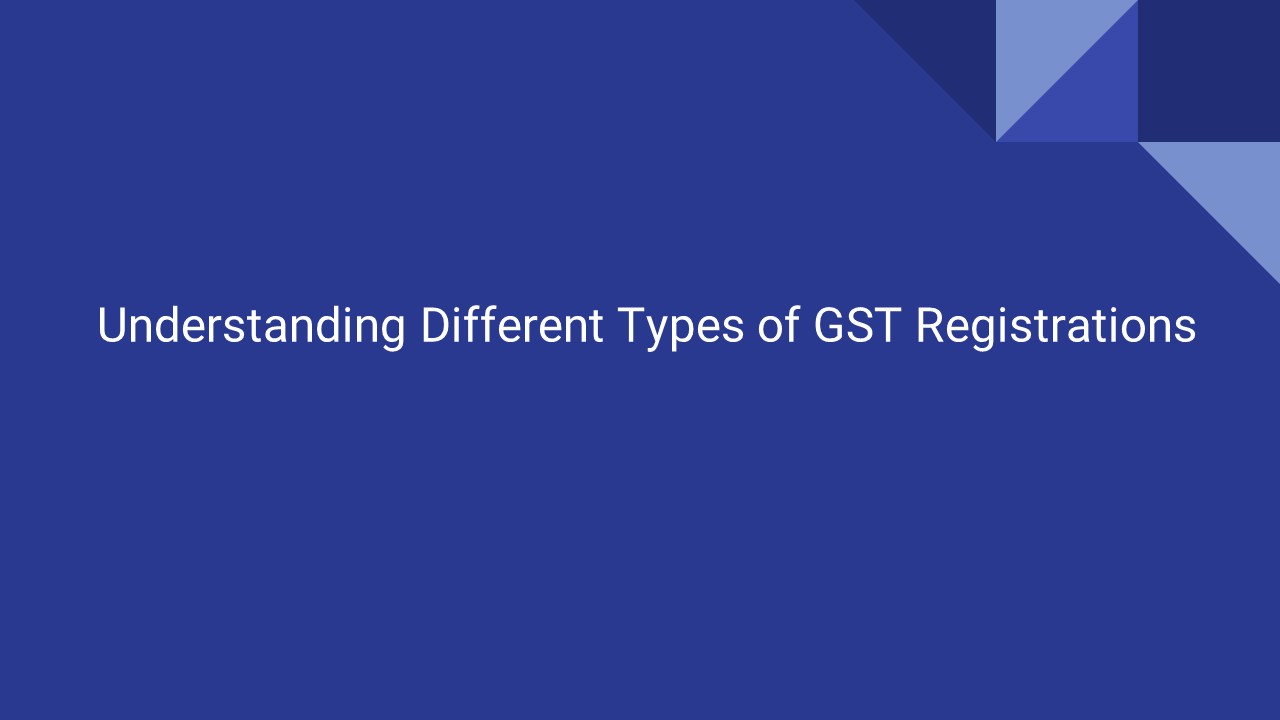Understanding Different Types of GST Registrations - PowerPoint PPT Presentation
Title:
Understanding Different Types of GST Registrations
Description:
GST registration is a vital necessity for Indian businesses, with its applicability determined by specific criteria, making it either obligatory or optional. The kinds of GST registrations available are contingent on factors like business type, location, and ownership structure. Prior to initiating the GST registration process, it is crucial to ascertain the most appropriate category that aligns with your business requirements, as the registration procedures and prerequisites diverge accordingly. – PowerPoint PPT presentation
Number of Views:1
Title: Understanding Different Types of GST Registrations
1
Understanding Different Types of GST Registrations
2
GST registration is a crucial requirement for
businesses in India, and it can be either
mandatory or voluntary, depending on certain
criteria. The types of GST registrations vary
based on factors such as the nature of the
business, location, and ownership. Before
applying for GST registration, it's essential to
determine the category that best suits your
business needs, as the registration process and
requirements differ accordingly.
Now, let's explore the various types of GST
registration categories Regular GST
Registration This category applies to businesses
with an annual turnover exceeding ?40 lakhs (or
?20 lakhs in special category states) for goods,
and ?20 lakhs for services or both. Even if the
turnover is less than ?20 lakhs, businesses that
supply goods to other states must obtain regular
GST registration. Casual Taxable Person
Registration Businesses that wish to participate
in trade fairs or exhibitions in states where
they are not registered must obtain temporary
registration to sell goods in those
states. Composition Scheme Registration Small
businesses with an annual turnover of up to ?1.5
crore can opt for this scheme. It simplifies the
tax ecosystem for small businesses, but they
cannot collect taxes from customers and cannot
claim input tax credits.
3
Input Service Distributor Registration
Multi-state businesses require this registration
to distribute input tax to all states where
services are consumed since GST is a
destination-based tax. Non-Resident Taxable
Person Registration Businesses located outside
India but regularly supplying goods or services
within the country need this registration. Tax
Deducted at Source (TDS) Registration
Departments or establishments of the Central or
State Government, Local Authorities, Government
Agencies, and specific categories of persons
identified by the government must obtain TDS
registration. They must deduct GST-TDS when
making payments to vendors if the transaction
value exceeds ?2.5 lakhs, in addition to income
tax TDS. Tax Collected at Source (TCS)
Registration E-commerce platforms that allow
third-party sellers to use their website must
obtain TCS registration. The operator deducts TCS
from customer payments when making payments to
suppliers. Unique Identification Number (UIN)
This special category of GST registration is
applicable to embassies, foreign diplomatic
missions, and UN bodies. They do not provide
taxable supplies, and taxes paid on inputs are
refunded.
4
- When to Apply for GST Registration in Different
Cases - For regular GST registration, if your business
turnover exceeds ?40 lakhs (or ?20 lakhs in
special category states) or involves inter-state
supply of goods or services, apply for
registration within 30 days of crossing the
threshold limit. - Casual Taxable Person Registration should be
applied for at least 5 days before commencing
business in the state. - For Composition Scheme Registration, apply before
the start of the financial year in which you wish
to opt for the scheme. - Input Service Distributor Registration should be
obtained before distributing input tax credits to
branches or units. - Non-resident taxable persons should apply for GST
registration at least 5 days before starting
business in India. - For TDS Registration, apply before deducting TDS
from payments to suppliers.
5
- Entities may require multiple categories of GST
registrations. For example, a business operating
in ten different states must obtain regular GST
registration in each state and an Input Service
Distributor registration to distribute input tax
credit across all ten states. - To calculate GST accurately, you can utilize
online GST calculators, ensuring precise GST
amounts for your bills. - TCS Registration should be obtained before
commencing business on e-commerce platforms. - UIN holders should obtain it before making any
purchases, as it allows them to claim tax refunds
if their UIN is mentioned on the tax invoice. - Except for UIN holders, all other taxpayers can
benefit from accounting software like CaptainBiz,
a mobile and online cloud-based billing software.
This software assists in managing invoices,
offering a seamless experience for businesses.
6
Visit our website https//www.captainbiz.com/
Contact us at support_at_captainbiz.com
7
Thank You































